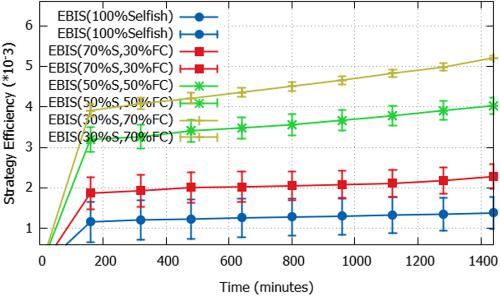当前位置:
X-MOL 学术
›
Int. J. Commun. Syst.
›
论文详情
Our official English website, www.x-mol.net, welcomes your feedback! (Note: you will need to create a separate account there.)
An evolutionary bargaining‐based approach for incentivized cooperation in opportunistic networks
International Journal of Communication Systems ( IF 2.1 ) Pub Date : 2020-03-02 , DOI: 10.1002/dac.4377 Ossama Nazih 1 , Nabil Benamar 2 , Mohamed Younis 3
International Journal of Communication Systems ( IF 2.1 ) Pub Date : 2020-03-02 , DOI: 10.1002/dac.4377 Ossama Nazih 1 , Nabil Benamar 2 , Mohamed Younis 3
Affiliation

|
Opportunistic networking enables users to communicate in an environment where connectivity is intermittent or unstable. However, such networking scheme assumes that mobile nodes voluntary cooperate, which cannot be guaranteed. Some nodes can simply exhibit selfish behavior and thus diminish the effectiveness of the approach. In this paper, a game scenario is formulated in which the nodes try to convince each other to participate in packets forwarding. Each node is considered as a player in this game. When a node comes in the communication range of another, a bargaining game starts between them as part of the message forwarding process. Both players try to have a mutual agreement on a price for message forwarding. We present a new incentive mechanism called evolutionary bargaining‐based incentive scheme (EBIS) to motivate selfish nodes to cooperate in data forwarding. In EBIS, a node negotiates with other nodes to obtain an agreeable amount of credit for its forwarding service. Nodes apply a sequential bargaining game and then adapt their strategies using an evolutionary model to maximize the probability of reaching an agreement. Unlike classical bargaining games, nodes in our model are boundedly rational. In addition, we use the evolutionary stable strategy (ESS) concept to determine the adaptive strategies for the nodes. The comparison of EBIS with a benchmarked model demonstrates that EBIS performs better in terms of packet delivery ratio and average latency.
中文翻译:

机会主义网络中基于谈判的演化谈判方法
机会网络使用户能够在连接间歇性或不稳定的环境中进行通信。但是,这样的联网方案假定移动节点自愿合作,这不能得到保证。一些节点可能仅仅表现出自私的行为,从而降低了该方法的有效性。在本文中,提出了一种游戏场景,其中节点试图说服对方参与数据包转发。每个节点都被视为该游戏中的玩家。当一个节点进入另一个节点的通信范围时,作为消息转发过程的一部分,他们之间会开始讨价还价游戏。双方都试图就消息转发的价格达成共识。我们提出了一种新的激励机制,称为基于进化议价的激励机制(EBIS),以激励自私的节点在数据转发中进行协作。在EBIS中,一个节点与其他节点进行协商以获得其转发服务的可接受的信用额度。节点应用顺序讨价还价博弈,然后使用进化模型调整其策略,以最大程度地达成协议。与经典的讨价还价游戏不同,我们模型中的节点是有限理性的。此外,我们使用进化稳定策略(ESS)概念来确定节点的自适应策略。EBIS与基准模型的比较表明,EBIS在数据包传输率和平均延迟方面表现更好。一个节点与其他节点进行协商,以获得其转发服务的可接受的信用额度。节点应用顺序讨价还价博弈,然后使用进化模型调整其策略,以最大程度地达成协议。与经典的讨价还价游戏不同,我们模型中的节点是有限理性的。此外,我们使用进化稳定策略(ESS)概念来确定节点的自适应策略。EBIS与基准模型的比较表明,EBIS在数据包传输率和平均延迟方面表现更好。一个节点与其他节点进行协商,以获得其转发服务的可接受的信用额度。节点应用顺序讨价还价博弈,然后使用进化模型调整其策略,以最大程度地达成协议。与经典的讨价还价游戏不同,我们模型中的节点是有限理性的。此外,我们使用进化稳定策略(ESS)概念来确定节点的自适应策略。EBIS与基准模型的比较表明,EBIS在数据包传输率和平均延迟方面表现更好。我们模型中的节点是有限理性的。此外,我们使用进化稳定策略(ESS)概念来确定节点的自适应策略。EBIS与基准模型的比较表明,EBIS在数据包传输率和平均延迟方面表现更好。我们模型中的节点是有限理性的。此外,我们使用进化稳定策略(ESS)概念来确定节点的自适应策略。EBIS与基准模型的比较表明,EBIS在数据包传输率和平均延迟方面表现更好。
更新日期:2020-03-02
中文翻译:

机会主义网络中基于谈判的演化谈判方法
机会网络使用户能够在连接间歇性或不稳定的环境中进行通信。但是,这样的联网方案假定移动节点自愿合作,这不能得到保证。一些节点可能仅仅表现出自私的行为,从而降低了该方法的有效性。在本文中,提出了一种游戏场景,其中节点试图说服对方参与数据包转发。每个节点都被视为该游戏中的玩家。当一个节点进入另一个节点的通信范围时,作为消息转发过程的一部分,他们之间会开始讨价还价游戏。双方都试图就消息转发的价格达成共识。我们提出了一种新的激励机制,称为基于进化议价的激励机制(EBIS),以激励自私的节点在数据转发中进行协作。在EBIS中,一个节点与其他节点进行协商以获得其转发服务的可接受的信用额度。节点应用顺序讨价还价博弈,然后使用进化模型调整其策略,以最大程度地达成协议。与经典的讨价还价游戏不同,我们模型中的节点是有限理性的。此外,我们使用进化稳定策略(ESS)概念来确定节点的自适应策略。EBIS与基准模型的比较表明,EBIS在数据包传输率和平均延迟方面表现更好。一个节点与其他节点进行协商,以获得其转发服务的可接受的信用额度。节点应用顺序讨价还价博弈,然后使用进化模型调整其策略,以最大程度地达成协议。与经典的讨价还价游戏不同,我们模型中的节点是有限理性的。此外,我们使用进化稳定策略(ESS)概念来确定节点的自适应策略。EBIS与基准模型的比较表明,EBIS在数据包传输率和平均延迟方面表现更好。一个节点与其他节点进行协商,以获得其转发服务的可接受的信用额度。节点应用顺序讨价还价博弈,然后使用进化模型调整其策略,以最大程度地达成协议。与经典的讨价还价游戏不同,我们模型中的节点是有限理性的。此外,我们使用进化稳定策略(ESS)概念来确定节点的自适应策略。EBIS与基准模型的比较表明,EBIS在数据包传输率和平均延迟方面表现更好。我们模型中的节点是有限理性的。此外,我们使用进化稳定策略(ESS)概念来确定节点的自适应策略。EBIS与基准模型的比较表明,EBIS在数据包传输率和平均延迟方面表现更好。我们模型中的节点是有限理性的。此外,我们使用进化稳定策略(ESS)概念来确定节点的自适应策略。EBIS与基准模型的比较表明,EBIS在数据包传输率和平均延迟方面表现更好。



























 京公网安备 11010802027423号
京公网安备 11010802027423号